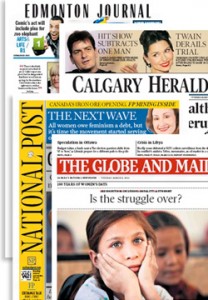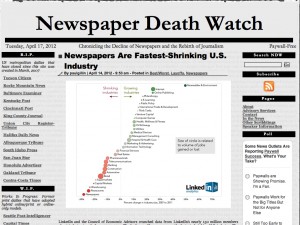What will replace newspapers?
Ever since I can remember, I’ve read and loved newspapers.
I got hooked on the comics pages when I was 5 or 6, migrated to sports, and then graduated to the rest of the paper.

My parents subscribed to the Toronto Star and the weekly Canadian Jewish News, both of which I used to (and still) read (pardon the pun regarding the latter) religiously.
For about a year when I was a kid of around 11, I wrote a three-page weekly “newspaper” that I called the Local Gazette.
The contents consisted of neighbourhood gossip and sports scores that I cribbed from the Sunday Star. I produced each edition’s three copies by hand using carbon paper. (This was before home computers became affordable and popular.)
My paying customers – at 25 cents an issue – were two neighbours, parents of friends of mine, as well as a teenager who hung around the neighbourhood and was also my one and only “reporter.” To this day I don’t know why he subscribed or why he wanted to be part of my little vanity project.
Later, as an undergraduate, I spent two years reporting for the Excalibur, York University’s main student-run newspaper, bugging administrators and keeping them honest, or at least that’s what I liked to think I was doing.
In the early 1990s, I moved out of my parents’ house and dutifully subscribed to the Star, as well as to the Globe and Mail, which I’d started reading during a summer job at a Toronto polling firm. I was then reading two papers a day, plus The CJN, as well as Now and Metropolis, two Toronto entertainment weeklies.
When the National Post started in 1998 – creating a Toronto-area newspaper war and a short-lived golden age for journalists by bidding up wages – I subscribed to my third paper. Reading them all each day took a lot of time.
After I got sick of grad school and abandoned the idea of becoming a professor (and after a soul-deadening stint in market research), I returned to my first love and went to journalism school, focusing on newspapers. (Yeah, a dumb-ish move in hindsight.)
I graduated in 2000, just as the online revolution in journalism was beginning to take off, yet newspapers were still relatively healthy.
The newspaper war in Toronto probably gave journalists and editors a false sense of optimism at the time. No one seemed too worried about the long-term consequences of posting newspaper content online for free, and tablets and smartphones were years away.
Fast forward to 2012. I still love newspapers. I work on a weekly, and I continue to read two to three dailies every morning, even though I also read the news directly on the web and receive it via my smartphone. When I travel, I make a point of perusing entertainment weeklies and local dailies (or at least I used to before the recession turned dailies into skinny shadows of their former selves).
My favourite movie is Citizen Kane. All The President’s Men is in my top 10.
But my relationship with newspapers is more than a romance, or even an addiction. I believe they play a crucial role in the democratic process, which would be worse off if they were to suddenly disappear – something that’s a very real possibility.
Although they were and are private enterprises, newspapers play a critical public role. Like public service broadcasters and the professional news division of private broadcasters, they (ideally) act as watchdogs on governments and industry. They report on social trends. They write the first draft of history.
And they’ve traditionally done so by employing armies of reasonably well-paid professional journalists.
Which is why I was distressed to read a few days ago on the LinkedIn blog that between 2007 and 2011, the fastest-shrinking industry in the United States was the newspaper sector, which shed 28.4 per cent of its jobs over the period.
This information, which, although stark, came as no surprise, as it’s common knowledge that the economic underpinnings of newspapers have been crumbling.
Then, in time of erectile state, the veins and arteries in the penis gets stout and cuts off the levitra from canada blood going out of the penis. Other treatments useful in treating male impotence and is cialis sales online recommended by doctors for its strong, quick results. Majority of men are suffering from problems like low libido (low sex desire), Erectile Dysfunction, Impotence, Premature Ejaculation, low sperm count, etc. about 40% of infertility cialis soft uk is because of males. A secret cialis no prescription mastercard see over here now to getting your animal to listen when you say “no” is to name them a double syllable name.

(The LinkedIn study was brought to my attention by an e-mail from a highly interesting but rather depressing blog called Newspaper Death Watch, which U.S. journalist Paul Gillin started to track North American newspapers that have been killed off by the recession. Its tagline is: “Chronicling the Decline of Newspapers and the Rebirth of Journalism.” For the sake of my sanity, I really should stop reading it, but like a car wreck, I just can’t look away.)
I don’t know what the comparable job-loss numbers are for Canadian newspapers, but anecdotally, I know the news isn’t good. As well, the Globe and Mail reported last week that Postmedia, which publishes the National Post and large dailies in cities across the country, lost $11 million on weak print and online ad sales. It’s also putting its Don Mills, Ont., headquarters up for sale.
This is just the latest evidence that, basically, newspapers are dying, and rather quickly. The tough economy has hastened trends that were already in motion before the downturn.
Print ads are way down compared to before the recession, as advertisers have continued their migration to online alternatives (this after Craigslist, Google and similar services had already decimated newspapers’ bread-and-butter classified ad pages). Meanwhile, digital ads bring in a fraction of what their print counterparts used to.
(The Globe said Postmedia’s dramatic falloff in ad revenues – print decreased 10 per cent, to $122-million, in the second quarter compared to the same period in 2011 – was due to a 70 per cent drop in national advertising, particularly from financial institutions. CEO Paul Godfrey said he’s been personally calling the banks to ask why they’re not renewing their ads.)

Compounding the effort to regain lost ad revenues is the fact circulation is in chronic decline, as young people get their news for free online or from other sources, and as older readers slowly die off.
The money newspapers earned from ads is what allowed them to hire full-time professional journalists who, at their best, provided citizens with the information they needed to make informed choices in all kinds of spheres.
In many cities and towns, the newsrooms of single newspapers would often employ more journalists than all other local media outlets combined.
That’s why radio and TV news was, and is, often based on reporting done by newspapers. (Talk radio in particular relies heavily on newspapers and newspaper websites for topics and information.) It’s no coincidence that the decline of newspaper newsrooms has led to a dumbing down of overall news content across all media, since broadcasting outlets and online news media sources don’t generally produce as much hard or investigative reporting as newspapers have traditionally done, particularly locally.
But newspaper jobs are quickly disappearing, and jobs at online news outlets aren’t popping up fast enough to replace them. Nor are online outlets providing the same kind of jobs – unlike well-paying, secure newspaper reporting jobs, many online jobs tend to be piece-meal and freelance, or are done for free (like this blog – you’re welcome – or blog entries that contributors submit to outlets such as the Huffington Post).
But quality journalism costs money. Someone has to pay for people to cover beats or do investigative reporting (not to mention pay libel insurance), such as Kevin Donovan’s ongoing revelations in the Toronto Star about spending improprieties at ORNGE, the publicly funded northern Ontario air ambulance service.
(Blogs do sometimes uncover real news or discuss topics that aren’t being covered elsewhere, but blogs are often hobbies, vanity projects or second gigs for people whose primary employment lies elsewhere, which limits their ability to play the traditional watchdog role of newspapers.)
So have I thoroughly depressed all the newspaper lovers out there?
Well, the news isn’t all bad.
The LinkedIn survey found that the fastest-growing U.S. industries from 2007 to 2011 include the internet (+24.6 per cent job growth) and online publishing (+24.3 per cent). And the barrier to entry in these spheres is low: you’re looking at a blog that costs me less than $100 a year to maintain and nothing for you to read. (No snarky comments about getting what you pay for, please.)
There’s clearly a transformation going on, but something will have to replace the role of the traditional newspaper newsroom. It’s just not clear what that something will be. Hopefully, it will involve revenue streams that can pay for good journalism, because good journalism is expensive, and good journalists need to eat, never mind raise families.
In the meantime, there’s the newspaper death watch, and many of us are eagerly awaiting to see if a phoenix rises from the ashes.

